Today, 23 June, is International Widows Day, the UN’s global day of action to fight discrimination against widows. This annual event was the brainchild of Lord Raj Loomba, whose Loomba Foundation has for 20 years helped poor widows and their children, and brought their plight to the world’s attention.
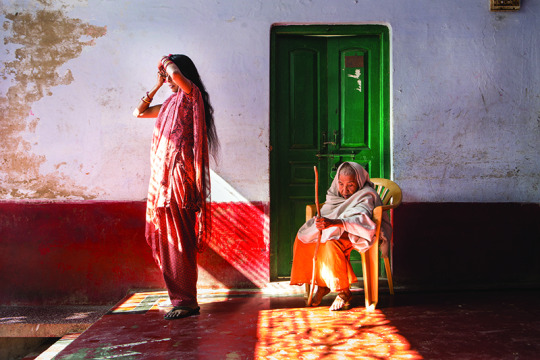
A young widow and an old widow at a government-supported ashram in Vindravan. Photograph © 2013 Amy Toensing.
The beginning
The story of The Loomba Foundation begins on 23 June 1954, when Jagiri Lal Loomba, a successful businessman in in the small Punjabi town of Dhilwan in the far North of India, died after battling tuberculosis, then a widespread threat to public health in India. His wife Pushpa Wati – Pushpa means flower in Hindi – was left at the age of 37 to care for the family’s seven children.
In accordance with custom, Jagiri’s mother – a widow herself – that same day ordered her daughter-in-law to remove her Bindi, the sign of a married woman, take off all her jewellery, and never to wear brightly-coloured clothing again. In an instant, Shrimati Pushpa Wati Loomba’s world had been shattered: she went from being blessed and happy to disconsolate and sorrowful.
The contrast had a profound impact on her ten-year old son. “I was too young to apprehend the situation,” Raj Loomba now recalls, “but gradually I saw that her life had totally changed. Before, she was a happy wife. Now, she was a very distressed widow.” In years to come, Raj would discover that the family still had much to be thankful for compared to the misery of others. But that was little comfort now, as he watched his mother’s despair.
The traditional injustices visited upon widows remained an ever-present feature of their lives and twelve years later, when Raj married Veena Chaudhry, “the priest asked my mother to move away from the altar, the reason being she was a widow and she could bring bad luck to me. I became very angry. Why, a mother who gave me birth, who educated me and always wished well for me – how could she bring me bad luck?”
The injustice meted out to his mother – symptomatic of a deep-rooted culture that brings misery to millions – is something Raj Loomba never forgot. When his mother passed away in 1992, her son, by now a successful businessman in the UK, resolved to do something about it. Five years later, in 1997, Raj and Veena Loomba established the Shrimati Pushpa Wati Loomba Trust – as The Loomba Foundation was initially known in the UK – to care for widows and their children, and to change the culture that discriminates against them. From the outset, the Foundation’s focus was not just on developing meaningful ways of improving the lives of those who suffered from this discrimination, but also on engaging governments, industry and wider society. On 25 March 1998, the charity was officially launched in London in the presence of British Prime Minister Tony Blair and his wife, Cherie Blair.
A year later, on 31 March 1999, the Prime Minister of India, Shri Atal Behari Vajpayee, in a ceremony attended by UK High Commissioner Sir Rob Young, inaugurated the Foundation in New Delhi by lighting a ceremonial lamp at his residence.The time had come to start making a difference.
Education
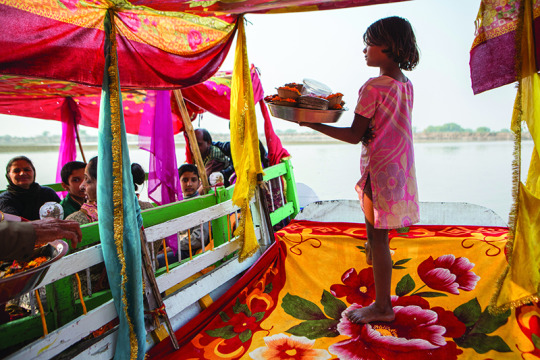
The money earned by eight-year-old Gunjan from selling flowers is the main source of income for her widowed mother and three siblings. Copyright © 2016 Amy Toensing.
To give her children the best chance in life, Shrimati Pushpa Wati Loomba made sure they were all well educated. “Fortunately for us,” Lord Loomba now recalls, “my father had left enough money. My mother spent it educating all of us at the best institutions.”
Raj Loomba studied at Iowa State University in the USA. His sisters graduated from Punjab University, at a time when many girls in India did not even go to school. There was little money left by the time the girls were all married and it took Raj Loomba many years to build his own international fashion business from the ground up, but none of this would have been possible without his father’s wealth, combined with his mother’s determined focus on education. “If I’d been the son of a poor widow,” he says, “I would have grown-up an illiterate man, possibly plying a Rickshaw in some suburban town in Punjab.”
In India, there are some 46 million widows – almost 10% of the female population of marital age – and of these, more than 15 million live in abject poverty. If there is an inheritance it is often taken by the husband’s relatives. By custom widows – even child widows – are not permitted to remarry and it is very hard for them to find any form of employment. As a consequence, their children are unable to continue their education and instead are put to work at a very young age to help support the family. The curse of widowhood thus sets in train a cycle of deprivation, with consequences that blight communities and last for many decades.
The Loomba Foundation saw that if it could fund the education of the children of poor widows, it would not only transform the conditions of that family but also provide for a better future for all its members. Thus, the first of the Loomba Foundation’s aid programmes began at the inauguration of the Loomba Foundation in India on 30 March 1999 by Prime Minister Atal Behari Vajpayee, with the launch of the Delhi State Programme funding 49 girls and 51 boys up to secondary graduation, and beyond for those who wished to go into higher education. This was part of a bigger target: to fund the education of at least 100 children of poor widows in each of India’s 29 States within a decade – a target which the Foundation beat by three years. By 2006, 3,610 scholars had their education completely funded to secondary graduation and many beyond, to achieve university degrees and make successful careers.
Empowerment
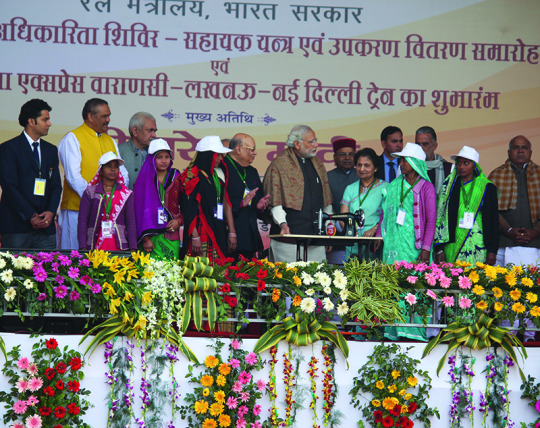
Indian Prime Minister Narendra Modi launches the Loomba Foundation’s widows empowerment programme in his constituency of Varanasi on 22 January 2016.
The focus of the Loomba Foundation’s second principal aid programme is the empowerment of widows. If in many villages, towns and cities and in numerous countries it is impossible for widows to find employment – whether because of discrimination or lack of skills – the inevitable consequence is that they must support themselves by other means, and all too often this leads to child labour, prostitution and other forms of exploitation. The Loomba Foundation’s empowerment programme invests in skills training, equipment and microfinance to help widows set up in business and become independent.
Working in partnership with governments and NGOs such as Youth Business International – a project of the Prince of Wales International Business Leaders Forum, Virgin Unite and Oxfam, the Loomba Foundation empowerment programme has delivered economic dependence for thousands of widows in countries including Sri Lanka, Bangladesh, Nepal, Syria, Kenya, Uganda, Chile, Guatemala, South Africa, Rwanda, and India.
According to the 2011 Population Census of India, the holy city of Varanasi in the State of Uttar Pradesh is home to 90,000 widows. The Loomba Foundation received powerful support from the Prime Minister of India, Narendra Modi, who represents Varanasi in the Lok Sabha and who on 22 January 2016 launched the Foundation’s programme to train and support 5,000 poor widows in the city. This project is due to be completed in July 2017.
Today, 23 June 2017, the Loomba Foundation launches its largest widows empowerment programme to date at the Dorchester Hotel in London – to deliver, in partnership with the Rotary India Literacy Mission, training and startup support for 30,000 poor widows in a wide range of skills and trades including Beauty & Wellness, Health & Care, Security, Telecom Services, Tourism & Hospitality, Handicrafts, Food Processing, Textiles & Apparel, Agriculture and Automotive.
International Widows Day
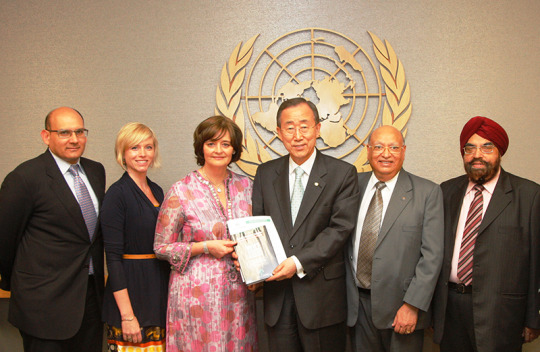
UN Secretary-General Ban Ki-Moon with the Loomba Foundation delegation presenting the first Global Widows Study in 2010.
The Loomba Foundation began its programmes to care for poor widows and their children in India because that is where the charity’s founders, Raj and Veena Loomba, had experienced first hand the injustice of entrenched attitudes towards widowhood, and also because the scale of the problem in that country is vast.
The more they spoke up about the marginalisation of widows, however, the more they came to realise that the issue is by no means confined to India, or even South Asia, alone. Customs vary from country to country and region to region, but in many parts of the world widows are at the bottom of the social heap – abused, cast out of society, deprived of their property and sometimes of their children too. All too often they are invisible and unheard, the poorest of the poor, unable to support their own dependants. As in India, so too in other parts of the world, the impact of this discrimination is highly detrimental for society as a whole, since it destabilises communities, creates extreme poverty that can last for generations, and gives rise to prostitution, drug trafficking, slavery, child labour and violence.
A global day of action
As we have seen, the Loomba Foundation extended its reach beyond India, with education and empowerment programmes in other countries across Asia, Africa and South America. Raj Loomba realised, however, that the problem could never be fully addressed without concerted global action to raise awareness, fight injustice and change deep-rooted cultures. This is why, on 26 May 2005, the Loomba Foundation launched a flagship new initiative: to designate 23 June as International Widows Day – a global day of action to bring the plight of widows to the attention of the world, so that in time it may be eradicated. On the day the initiative was launched at the House of Lords in London, Raj Loomba also initiated a campaign to persuade the United Nations to give the initiative its official recognition.
From the beginning, International Widows Day galvanised support from a wide range of organisations: grassroots organisations, NGOs, governments, corporations and individuals around the world. The Loomba Foundation organised and facilitated events in dozens of countries, including high profile conferences, concerts, balloon flights and petitions.
Five years after the Loomba Foundation launched its initiative, its campaign bore fruit. On 22 December 2010 the United Nations General Assembly, on a motion proposed by president Ali Bongo Ondimba of Gabon, unanimously resolved to adopt International Widows Day as an officially recognised global day of action, to take place every year on the date when, in 1954, Shrimati Pushpa Wati Loomba had become a widow: 23 June.
Since this was the first time the suffering of hundreds of millions on widows and their dependents had been officially highlighted by the international community, it was an important step in bringing light where for so long there has only been darkness.
The number of events to raise awareness around the world has grown substantially since, and each year on 23 June the UN Secretary-General sends a message to all member states to remind them of the issue and International Widows Day has become established as a cornerstone in the ongoing campaign to eradicate all discrimination against widows from the world.
Research
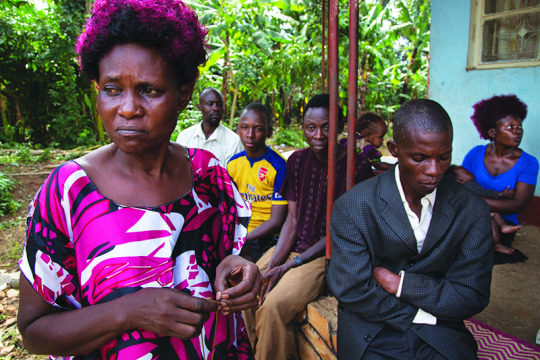
Solome Sukuli, a widow in Luwero, Uganda, and her family were threatened with eviction by her in-laws on the day of her husband’s funeral. Copyright © 2016 Amy Toensing.
As long ago as 2001, UN Women said that “there is no group more affected by the sin of omission than widows. They are painfully absent from the statistics of many developing countries, and they are rarely mentioned in the multitude of reports on women’s poverty, development, health or human rights.”
Eradicating discrimination against widows requires action and leadership by governments as well as fundamental change in deep-rooted cultures and traditions. Neither of these are possible without deep and detailed knowledge of the problem.
This is why, when the Loomba Foundation embarked on its International Widows Day initiative, it simultaneously began a research programme to address this omission and to uncover the scale of discrimination against widows, its many forms, its roots and its impact on the economy around the world.
In 2008, the Royal Institute for International Affairs at Chatham House in London and the WorldPublicOpinion.org international survey organisation managed by the Program for Public Consultation in Washington, D.C., were commissioned by the Loomba Foundation to build up a picture of international attitudes towards widowhood. The results were revealing. Of 18 countries polled, 12 saw at least 40% of respondents reporting some or a great deal of widows’ disadvantage. More than six out of ten respondents globally said that widows received worse treatment than women generally. Indicating through the geographic spread of its responses that widows’ deprivation is not exclusive to any one culture, society or region, the survey led the Loomba Foundation to undertake a far broader and more ambitious project that had never previously been attempted: to build up a global picture of existing knowledge about the treatment of widows.
The first manifestation of this work was the Global Widows Study, published in 2010 as an addendum to the book Invisible Forgotten Sufferers by Vijay Dutt. The study examined disparate existing data sources to establish widow numbers in different regions of the world, their relative proportion in the female population, principal causes and drivers of widowhood underlying these numbers, traditions and customs that lead to abuse, and the social and economic impact of discrimination. The evidence of the global nature and scale of the problem that was revealed in the study was a factor in the UN’s adoption of International Widows Day on 22 December 2010.
The World Widows Report
The research continued on a larger scale, leading to the publication in 2016 of the first edition of the World Widows Report, which provides a unique complete, country by country, regional and global quantitative breakdown of data about widows. It brings together data from national and international census archives with disparate and inaccessible material from unusual and hard to find sources, including in-depth studies in academic journals and reports by international development organisations.
The World Widows Report is the first comprehensive compilation of current knowledge about the plight of widows, country by country and worldwide. It showed that discrimination against widows is deeply ingrained in cultures across all continents, resulting in extreme poverty, gender-based violence, child labour, discrimination against girls, increased infant mortality and numerous other severe consequences which directly affect almost a billion people around the world. Significant change in these patterns will only come about if the underlying causes are directly addressed through legislation, education and empowerment.
Research also drives and informs media reporting, a key factor in increasing awareness and changing attitudes. Publication of the World Widows Report received widespread coverage in outlets from Reuters to the India Times and the scale of worldwide discrimination against widows it revealed was the basis of a major feature by Cynthia Gorney in the February 2017 issue of National Geographic Magazine, with photographs by Amy Toensing, some of which are reproduced here.
Copies of the World Widows Report can be ordered here. The Loomba Foundation is working with leading academic institutions to extend research and study in this area.
The future
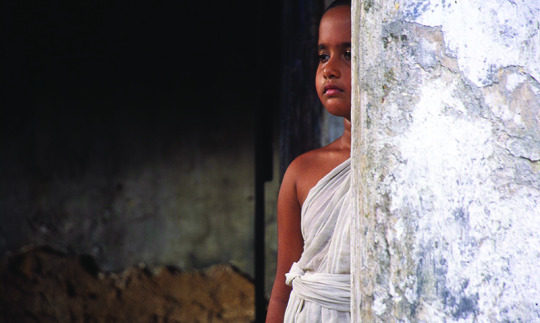
Chuyia (Sarala Kariyawasam) is an eight-year-old girl whose husband suddenly dies. In keeping with tradition, she is dressed in white, her head shaven, and left in an ashram, to spend the rest of her life in renunciation. – Scene from the award-winning film Water by Deepa Mehta.
In 2017, widows still face discrimination in many parts of the world, with almost 40 million in extreme poverty and their children often exploited and unable to receive an education. While some customs and practices are most degrading and extreme in some regions, widowhood hangs like a dark cloud over women almost everywhere for as long as society views the status of women in terms of their men. The economic risk to families of widowhood causes parents and grandparents to favour boys over girls for education and employment, and so a cycle of deprivation is set in train that affects all humanity. This is why widowhood is not a special interest issue, but a universal one that must be treated with the highest priority if the Sustainable Development Goals adopted by the United Nations in 2015 are to be achieved.
The Loomba Foundation’s aid programmes have transformed the lives of more than 200,000 people, but we know that even if that figure is increased by a multiple of ten, it will still only scratch the surface of the problem. This is why the Loomba Foundation will continue working with governments, international organisations and partners around the world, raising awareness through International Widows Day and carrying out further research to underpin policy and, ultimately, to change cultures so that girls and women can fulfil their potential, and widows can take their rightful place as valued and treasured members of all communities.
The Loomba Foundation is accredited as a Non-Governmental Organization with the United Nations Department of Public Information and has Special Consultative Status on its Economic and Social Council.
Amy Toensing’s photography collection, Widowhood, will be exhibited at Visa pour l’Image, the International Festival for Photojournalism, in Perpignan, France, in September 2017. The project was partially supported by the Pulitzer Center on Crisis Reporting and by National Geographic Magazine.
This feature is an edited extract from Twenty successful years, written by Kasper de Graaf, designed by Malcolm Garrett, produced by Images&Co and published by The Loomba Foundation on 23 June 2017 to commemorate its 20th anniversary. A digital version of the book may be viewed here.

